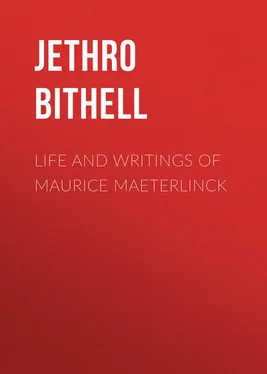Jethro Bithell - Life and Writings of Maurice Maeterlinck
Здесь есть возможность читать онлайн «Jethro Bithell - Life and Writings of Maurice Maeterlinck» — ознакомительный отрывок электронной книги совершенно бесплатно, а после прочтения отрывка купить полную версию. В некоторых случаях можно слушать аудио, скачать через торрент в формате fb2 и присутствует краткое содержание. ISBN: , Жанр: foreign_antique, foreign_prose, на английском языке. Описание произведения, (предисловие) а так же отзывы посетителей доступны на портале библиотеки ЛибКат.
- Название:Life and Writings of Maurice Maeterlinck
- Автор:
- Жанр:
- Год:неизвестен
- ISBN:http://www.gutenberg.org/ebooks/38917
- Рейтинг книги:3 / 5. Голосов: 1
-
Избранное:Добавить в избранное
- Отзывы:
-
Ваша оценка:
- 60
- 1
- 2
- 3
- 4
- 5
Life and Writings of Maurice Maeterlinck: краткое содержание, описание и аннотация
Предлагаем к чтению аннотацию, описание, краткое содержание или предисловие (зависит от того, что написал сам автор книги «Life and Writings of Maurice Maeterlinck»). Если вы не нашли необходимую информацию о книге — напишите в комментариях, мы постараемся отыскать её.
Life and Writings of Maurice Maeterlinck — читать онлайн ознакомительный отрывок
Ниже представлен текст книги, разбитый по страницам. Система сохранения места последней прочитанной страницы, позволяет с удобством читать онлайн бесплатно книгу «Life and Writings of Maurice Maeterlinck», без необходимости каждый раз заново искать на чём Вы остановились. Поставьте закладку, и сможете в любой момент перейти на страницу, на которой закончили чтение.
Интервал:
Закладка:
The mysterious coming of death is the theme of The Intruder , a play by Maeterlinck which was published in 1890. It appeared as the first of two plays in a volume called Les Aveugles (The Sightless). This is the name of the second play in the book; but the grandfather in The Intruder too is blind, and through both plays runs the idea that we are blind beings groping in the dark (in Plato's cavern), and that those who see least see most.
The subject of The Intruder can be told in a few words. In a dark room in an old castle are sitting the blind grandfather, the father, the uncle, and the three daughters. In the adjoining room lies the mother who has recently been confined. She has been at death's door; but at last the doctors say the danger is over, and all but the grandfather are confident. He thinks she is not doing well… he has heard her voice. They think he is querulous. The uncle is more anxious about the child: he has scarcely stirred since he was born, he has not cried once, he is like a wax baby. The sister is expected to arrive at any minute. The eldest daughter watches for her from the window. It is moonlight, and she can see the avenue as far as the grove of cypresses. She hears the nightingales. A gentle breeze stirs in the avenue; the trees tremble a little. The grandfather remarks that he can no longer hear the nightingales, and the daughter is afraid someone has entered the garden. She sees no one, but somebody must be passing near the pond, for the swans are afraid, and all the fish dive suddenly. The dogs do not bark; she can see the house-dog crouching at the back of his kennel. The nightingales continue silent – there is a silence of death – it must be a stranger frightening them, says the grandfather. The roses shed their leaves. The grandfather feels cold; but the glass door on to the terrace will not shut – the joiner is to come to-morrow, he will put it right. Suddenly the sharpening of a scythe is heard outside – it must be the gardener preparing to mow the grass. The lamp does not burn well. A noise is heard as of someone entering the house, but no one comes up the stairs. They ring for the servant. They hear her steps, and the grandfather thinks she is not alone. The father opens the door; she remains on the landing. She is alone. She says no one has entered the house, but she has closed the door below, which she had found open. The father tells her not to push the door to; she denies that she is doing so. The grandfather, who, though he is blind, is conscious of light, thinks they are putting the lamp out. He asks whether the servant, who has gone downstairs, is in the room: it had seemed to him that she was sitting at the table. He cannot believe that no one has entered. He asks why they have put the light out. He is filled with an unendurable desire to see his daughter, but they will not let him – she is sleeping. The lamp goes out. They sit in the darkness. Midnight strikes, and at the last stroke of the clock they seem to hear a noise as of someone rising hastily. The grandfather maintains that someone has risen from, his chair. Suddenly the child is heard crying, crying in terror. Hurried steps are heard in the sick woman's chamber. The door of it is opened, the light from it pours into the room, and on the threshold appears a Sister of Charity, who makes the sign of the Cross to announce the mother's death.
Already in The Princess Maleine the miraculous happenings could all be explained by natural causes. Still more so in The Intruder . It was not the reaper Death who was sharpening his scythe, but the gardener. If the lamp goes out, it is because there is no oil in it. Accompanying the naturalness of the atmosphere (the atmosphere that is natural when a patient is in danger of dying), there is the naturalness of the dialogue. The family is worn out with anxious watching: how natural then is the sleepy tone of the talking, which is only quickened somewhat by the apparent irritability of the grandfather:
THE FATHER: He is nearly eighty.
THE UNCLE: No wonder he's eccentric.
THE FATHER: He's like all blind people.
THE UNCLE: They think too much.
THE FATHER: They've too much time on their hands.
THE UNCLE: They've nothing else to do.
THE FATHER: It's their only way of passing the time.
THE UNCLE: It must be terrible.
THE FATHER: I suppose you get used to it.
THE UNCLE: I dare say.
THE FATHER: They are certainly to be pitied.
In this play, as also in The Sightless , and later on in The Life of the Bees , Maeterlinck shows himself a master of irony. The passage just quoted is an example.
To Maeterlinck, with reference to The Intruder , has been applied what Victor Hugo said to Baudelaire after he had read The Flowers of Evil : "You have created a new shudder." Certainly, the new frisson is there; but was it Maeterlinck who created it? It will be well to go into this question; for Maeterlinck, in connection with The Intruder , has been charged with plagiarism.
The Intruder first appeared in La Wallonie for January, 1890. In the same periodical for January, 1889, that is, exactly a year before, had appeared Les Flaireurs , a drama in three acts by Maeterlinck's friend, Charles van Lerberghe. It is dedicated "to the poet Maurice Maeterlinck." The title is annotated: "Légende originale et drame en 3 actes pour le théâtre des fantoches." Here, to begin with, we have a "drama for marionettes." Maeterlinck seems to have first used the word "marionette" in connection with his plays when undergoing cross-examination by Jules Huret, whose Enquête was published in 1891: when writing Princess Maleine , he said, he had wanted to write "a play in Shakespeare's manner for marionettes." Maeterlinck and van Lerberghe were seeing each other nearly every day at the time Les Flaireurs was being written; and there is nothing to show that they did not discuss their theories of the drama; it is only certain that with regard to the idea, superb irony, of a theatre for marionettes, the published priority rests with van Lerberghe. Van Lerberghe, however, was charged with having imitated Maeterlinck; and it was only when Maeterlinck himself proclaimed the priority of Les Flaireurs 48 48 In a letter inserted in the programme when Les Flaireurs was staged by Paul Fort at the Théâtre d'Art (after The Intruder had gone over the same boards). This statement of Maeterlinck's is a noble defence of his friend, and, as such, not to be trusted.
that the charge of plagiarism was turned against him. Now the fact is that Maeterlinck, to a certain extent, collaborated in Les Flaireurs .
The subject of the two plays is identical; both symbolise the coming of death to a woman. But each is entirely independent. In Les Flaireurs death is expected; in The Intruder it is not expected. In van Lerberghe's play resistance is offered to visible personifications of death; in Maeterlinck's play resistance is impossible, because death is invisible. The first play is full of brawling noise, and peasant slang, and the action is violent: the second is only a succession of whispers tearing the web of silence; 49 49 But Death, in The Intruder , is understood to have made some noise while coming upstairs.
nothing visible happens, there is only expectancy. In short, one play is for the senses; the other is for the soul. The charge of plagiarism is absolutely unfounded: it is only a case of friendly rivalry in the working out of an idea – the tale indeed goes that the idea occurred to the two friends simultaneously. If it really was a game of skill, it would be hard to say who was victor: each play is a masterpiece.
The scene of Les Flaireurs is laid in a very poor cottage. It is a stormy night; the rain whips the windows, the wind howls, and a dog is barking in the distance. The room is lit by two candles. Loud knocking at the door. A girl jumps out of the bed with gestures of terror. She is in her night-shirt; her fair hair is unbound. She asks: "Who is there?" and "The Voice," after some beating about the bush, answers: "I'm the man with the water." The voice of the mother, who thinks it is Jesus Christ, is heard from the bed urging the daughter to let Him in. She refuses, and the man answers that he will wait. Ten o'clock sounds, and the daughter puts the two candles out. ACT II. Knocking at the door again. The two candles are relit, and the daughter is seen standing against the bed, at watch, with her face turned towards the door. A voice is heard demanding admittance. "You said you would wait," says the girl. "Why, I've only just come!" answers the voice. She asks who he is, and he replies, "The man with the linen." The mother again urges her to open the door – she thinks it is the Virgin Mary. The daughter is obstinate, and the voice cries, "All right, I'll wait." ACT III. Louder knocks, and a voice again. This time it is "The man with the … thingumbob." The mother still thinks it is the Virgin Mary. She bids her daughter raise the curtain: and the shadow of the hearse is projected on the wall. The mother asks what the shadow is; the daughter drops the curtain. The voice now answers brutally: "I'm the man with the coffin, that's what I am." The neighing of horses is heard. The girl dashes herself against the door, but it is beaten in. An arm is seen putting a bucket into the room. Midnight strikes. The old woman utters a hoarse cry; the daughter, who had been holding the door back, rushes to the bed; the door falls with a mighty din, and extinguishes the two candles.
Читать дальшеИнтервал:
Закладка:
Похожие книги на «Life and Writings of Maurice Maeterlinck»
Представляем Вашему вниманию похожие книги на «Life and Writings of Maurice Maeterlinck» списком для выбора. Мы отобрали схожую по названию и смыслу литературу в надежде предоставить читателям больше вариантов отыскать новые, интересные, ещё непрочитанные произведения.
Обсуждение, отзывы о книге «Life and Writings of Maurice Maeterlinck» и просто собственные мнения читателей. Оставьте ваши комментарии, напишите, что Вы думаете о произведении, его смысле или главных героях. Укажите что конкретно понравилось, а что нет, и почему Вы так считаете.












